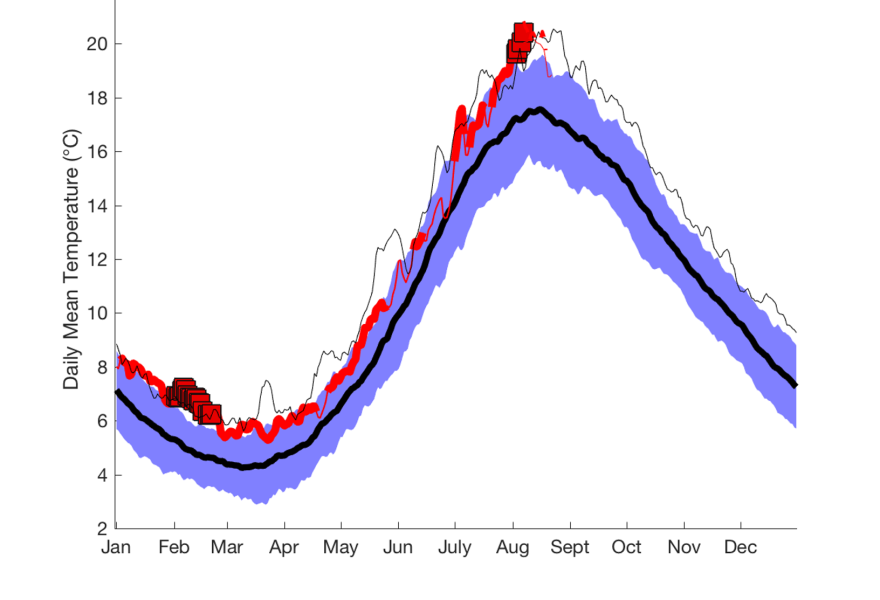Water temperatures in the Gulf of Maine are on course to be some of the warmest on record, and the "marine heatwave" is being associated with disruptions in the gulf's ecosystem. Some animals in the Gulf, though, seem to be adapting to the changes.
Scientists at the Gulf of Maine Research Institute (GMRI) use satellite data to chart surface-level water temperatures at some 400 locations in the Gulf. And through early summer, it looked like those measurements might fall within historical norms.

“But then in July the temperatures just started to really shoot up,” says Andrew Pershing, the institute's chief scientific officer. “We were watching in early August as the temperature started to hit levels we've never seen before for that time of year. And we actually hit temperatures that were very close to setting an all-time record for the Gulf of Maine.”
On August 8 GMRI recorded an average temperature of more than 68 degrees Fahrenheit — just five one-hundredths lower than a record set in 2012. And, as in that year, the high water temperatures this year are associated with an abundance of some species that are usually found farther south, such as squid, black sea bass and butterfish.
At the same time, a scarcity of herring this year is limiting fishing quotas for the traditional lobster trap bait, and it's making life difficult for herring-dependent species, such as puffins.
Linda Welch is a refuge biologist with the Maine Coastal Islands National Wildlife Refuge.
"Throughout July a lot of the seabirds were having difficulty finding food to in order feed their chicks,” says Welch. “We saw ten chicks dying, and a lot of the puffin chicks were losing weight and weren't developing as they normally should."
More recently, she says, the chicks seem to be faring better.

The leader of the Audubon Society's Project Puffin, Steven Kress, says adult birds are responding flexibly to changes in the water. They are prospecting for prey among the newer species, including squid, he says. They are also increasing the number of times they feed their young from roughly 1 to 3 times per day to as many as 19. The usual chick-rearing season has been extended, he says, allowing them more time to put on weight.
"The season isn't over until it's over,” says Kress.
Documenting change in the warming Gulf of Maine is bringing a stream of surprises to the scientists who study what is one of the fastest-warming saltwater bodies in the world. As one scientist put it, "warm equals weird."
Kohl Kanwit, who monitors algal blooms for the state's Department of Marine Resources, says that species never before observed here are showing up and thriving.
"Yes, yes. I mean Karenia mikimotoi was never documented in the Gulf of Maine prior to two years ago,” says Kanwit. “That's a recent problem I would say has a lot to do with temperature.”
GMRI's Andrew Pershing says this decade marks a new era of repeated marine heatwaves, characterized by extended periods of above-average temperatures, in the Gulf. He cites a combination of factors, including general warming of the planet, with all its waters acting as a heat sink. But Pershing says the satellite data are also revealing some specific phenomena: the melting of the Greenland ice-pack is disturbing usual current patterns in the North Atlantic while a blob of warm water, possibly from the sub-tropical gulf stream, is coursing into a deep-water channel on the Gulf's eastern perimeter.

"This kind of mushroom-shaped blob of really, really warm, water, and it comes and goes in pulses,” says Pershing. “But that warm water has been there, and when we see that warm water kind of piling up in that region, those are often the years where we get set up for these really extreme temperatures."
Pershing says this year is on track to be the third warmest on record in the Gulf of Maine's waters, and may end up as the second warmest.
Originally published 5:27 p.m. Thursday August 30, 2018.


